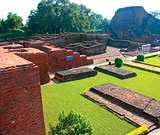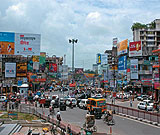For Indians, the period between 1834 and 1924 is the landmark era when relations between India and Mauritius began to be cemented. Around 450,000 Indians were shipped by British rulers as indentured labourers to Mauritius during this time. They came from all parts of India but most of them were from the state of Bihar. A reflection of this is that among the official languages registered in Mauritius, Bhojpuri is the second most widely used tongue, spoken by more than 12.1 per cent of the population preceded only by Creole. No other Indian language is recognised in the country.
The early immigrants that came from Bihar travelled in groups from the same village or region. So, they were more easily able to set up the social paradigm and religious practices that suited them. This is a prime reason for their large numbers in Mauritian society, even after one and a half century.
Bihar, today, is undergoing a rapid transformation and is poised to regain the glory of its past. It’s time for people like you
(Mauritians) to get engaged, participate and prosper in its resurgence
— Nitish Kumar, CM Bihar
The GOPIO organised the Bihar Week in Mauritius in order to promote cultural, tourism and business links between Mauritius and the state of Bihar. The fillip given to Foreign Direct Investment in Bihar and Mauritius is believed to go a long way at translating the Comprehensive Economic Cooperation and Partnership Agreement (CEPCA) into reality, tourism exchanges can prove to be a vector for such investments.
Bihar is situated in eastern India, surrounded by Nepal, West Bengal, Uttar Pradesh and Jharkhand. The river Ganga, cutting straight across the state from west to east renders the region fecund and abundant in crops and cereals. The state covers an area of 84,164 sq km and has a population density of 880 per sq km. Its 38 districts contain a population of 62.87 million. The main languages spoken are Hindi, Bhojpuri and Maithili.
The name Bihar is derived from Vihara meaning monastery. Very rich in natural resources, its development until now has been rather slow compared to many other lesser endowed states in India. However, its true fame as well as greatness lies in its spiritual attraction both for Indians as well as foreigners. For Hindus, Jains and Buddhists, Bihar is a primordial pilgrimage centre.
The reasons have their roots in history. For one, it was in Bodhgaya, Bihar that Lord Buddha attained Nirvana or enlightenment. Arising there from Bihar was also the birthplace of Emperor Ashoka, perhaps the greatest devotee of Buddha. Ashoka whose empire stretched up to Iran and Afghanistan won a war. Witnessing its ravages, he renounced kingship in order to preach Buddha’s philosophy of ahimsa (non-violence) throughout the world. The historical importance of Bihar has also been with the discovery of biggest ever Buddha Stupa in the state by Archaeological Survey of India.
Next, Lord Mahavir, the founder of Jainism, was born in Bihar. His teachings have spread throughout India and, today continues to inspire people with sagacity and sapience of thought.
Bihar’s Economy and Investment Opportunities
While the economy is chiefly agriculture-oriented, vast vistas of investment opportunities have now opened up, thanks to Government initiatives and increasing public awareness. Handicraft also forms a major source of its income. The principal food grains of Bihar are paddy, wheat, maize and pulses. The main cash crops include sugarcane, potato, tobacco, oilseeds, onions, chillies jute and mesta.

 
As for the rest, fertile land, abundance of water, cheap and industrious labour, business friendly environment, economic incentives, safe and congenial business environment and top class human resource make the state an ideal place to invest in. Chief Minister, Nitish Kumar says, “Bihar is on the move. The state is poised for major development and growth in the next few years. The business framework has been changed significantly creating a superior investment climate.” Meanwhile says Ratan N. Tata, Chairman Investment Commission, “ Bihar is emerging as an investment destination.”
Bihar can accelerate India’s GDP growth rather than drag it down as in the past
— N.K. Singh, former Planning Commission member
What then are the reasons for such optimism? The answer is major reforms in financial strategies initiated by the Government. The New Industrial Policy incorporates several incentives for private business. Major institutional reforms have been undertaken to increase transparency and reduce the time taken to clear investment proposals. As a result of this private capital has begun impacting strategic areas such as power, agro-processing, leather, textiles, sugar, roads and bridges. According to N.K. Singh, former Planning Commission member, “We are looking at an upward journey of exponential growth and Bihar can accelerate India’s GDP growth rather than drag it down as in the past.”
The Government’s decision to prioritise investment in Bihar reflects itself in its strategy for growth, policy initiatives and the new Industrial Incentive Policy 2006. These have further augmented investment climate in the state as never before. Other projected fall-outs of Government’s strategies are:
- Share of private investment in total investment is expected to grow from 59 per cent to 65 per cent upto Rs.108,000;
- State intends to attract large share of private investment and Foreign Direct Investment
(FDI);
- Strategy would be through Infrastructure Development as well as Investments in Social Services, eg., Education, Health and Nutrition and
- Emphasis on Public Private Partnership (PPP) in certain key areas.
As CM Nitish Kumar summed up during the Bhojpuri Week, “Bihar, today, is undergoing a rapid transformation and is poised to regain the glory of its past. It’s time for people like you (Mauritians) to get engaged, participate and prosper in its resurgence.”
|